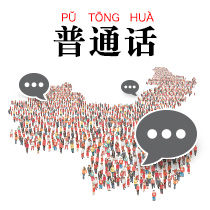Asia News
- Home
- News
- Asia News
You've successfully copied this link.
The power of Mandarin, China's universal common speech

Did you know? The Mandarin language, or Putonghua in China, literally translates to “Common Speech”.
This is because Chinese is actually a macrolanguage. It includes many languages and a vast mishmash of dialects, such as Yue (Cantonese), Hakka, Min (Hokkien), Gan, Xiang, Wu, and more.1
The roots of the Putonghua
 Originally based on the Beijing dialect, Mandarin was first established as the official language of the Yuan dynasty’s government and administration six centuries ago.2
Originally based on the Beijing dialect, Mandarin was first established as the official language of the Yuan dynasty’s government and administration six centuries ago.2
Known as Guanhua back then, Mandarin was essential for those who aspired to be an official or sought business with the imperial court.2
Today, Mandarin – officially known as Modern Standard Chinese – is the national bridge language of China and widely used intelligibly by most Chinese people. Strong regional accents still prevail, though, which helps pinpoint the origins of the Chinese speaker.
Interestingly, though subtle, it can also sometimes differentiate a Chinese speaker’s nationality depending on how they refer to it. Here are three other ways Mandarin is commonly referred to in different parts of the world:
- Guo yu (國語): Predominantly used in Taiwan, where it literally means “national language”.
- Hua yu (åŽè¯): Usually used in Southeast Asia, such as Singapore and Malaysia, where it simply means “Chinese language”.
- Han yu : Lesser used, but still prevalent in the US and other parts of the world with members of the Chinese diaspora, this means “language of the Han tribe”.
Mandarin, the language of tomorrow
With nearly 1.2 billion speakers around the world1 – and the growing fact that China may soon become the world's largest economy – Mandarin seems set to be a new lingua franca of the future – a language or dialect systematically used to make communication possible between people who do not share a native language or dialect.
In 2011, Bloomberg reported Mandarin as the #2 most useful business language after English.3
While learning Mandarin is daunting, with it's reputation as one of the most complicated language in the world, its benefits are immense.
Being able to speak Mandarin offers a world of advantage for those seeking to do business in China – enabling them to further deepen their 'guanxi' with Chinese clients and conduct negotiations with a degree of flexibility, knowledge, and sophistication that would never be achieved with a language barrier.
Additionally, learning Mandarin can also deepen your understanding of Chinese people, as well as their culture and customs. In other words, learning Mandarin can help bridge the gap between two cultures, and suddenly, you’ll find an all-new world opening up to you.
Countries abroad endorse Mandarin learning
Even as far back as 2013, British Prime Minister David Cameron was already a staunch advocate of the language, urging UK youths to focus on mastering China's official tongue over the traditional French and German languages after his three-day visit to China.4
According to Cameron, this is because he wants Britain to be linked up with the world's fast-growing economies, and achieving this requires the younger generation to begin learning ‘the languages to seal tomorrow's business deals.’
“By the time the children born today leave school, China is set to be the world's largest economy. So it's time to look beyond the traditional focus on French and German and get many more children learning Mandarin," said Cameron.4
In the US, President Barack Obama’s daughter Sasha is also learning Mandarin.5 Some schools, such as the Arizona Language Preparatory in Northeast Phoenix, are already teaching Mandarin to their students alongside English and Spanish to great success – the students’ state testing scores exceeded the average.6
In fact, even some far-flung countries, such as South Africa, are ramping up Mandarin proficiency levels – Angie Motshekga, Basic Education Minister of South Africa, recently announced a plan to have 500 schools offer Mandarin as a second additional language in the next five years.7
No Mandarin? Let us do the talking
So most probably agree that learning Mandarin is a valuable investment. That said, even if you don’t speak Mandarin, you can still be successful with Chinese buyers.
After all, Mandarin is a difficult language, and some may not have the time to devote to it. So If you want to reach Chinese buyers now, without mastering Mandarin, our advice is to take baby steps – learn some basics.
Simple greetings are a good start, like how to introduce yourself. You could also pick a Chinese name, which will help Chinese buyers remember you better.
And if you’re worried your pronunciation would be terrible, don’t. Any attempt to speak Chinese will be well received. In fact, your effort to learn their language will be much appreciated, and may even break the ice to bolster their comfort level with you as their preferred agent.
As for the other nitty-gritty details, like translating your listings to Chinese or advertising via Chinese advertorials and Email Direct Marketing (EDMs), we’re more than happy to help you.
Find out more about Juwai products with language support here.
Sources: 1. Ethnologue-Languages of the World, CIA-US, Unesco, United Nations, University of Düsseldorf, The Washington Post; 2. Wikipedia: Mandarin (Late Imperial Lingua Franca); 3. Bloomberg; 4. SCMP; 5. Qz.com; 6. 12News; 7. News24.com
Liked this article? Sign up for free to get Juwai Juwai Asia Market updates!
Sort By
- 2023
- 2022
- 2021
- 2020
- 2019
- 2018
- 2017
- 2016
- 2015
- 2014
- 2013
- 2012
Tags
- australia
- china
- chinese buyers
- investment
- juwai
- property
- real estate
- residential
- united kingdom
- united states
Resources
Our Property Marketplaces
Juwai.com >
Global property portal available in Chinese
Juwai.asia >
Asia wide portal for global real estate
Juwai News
Subscribe to receive the latest news on Asian buyers, the Asia market, and Juwai.
Thank you for subscribing to Juwai News!
Sign up for a Juwai Account now for free to enjoy FREE download access to country-specific reports on Chinese property investments.
Do you want to sign up now? Or continue if you have already signed up or you will do it later.
Thank you!
You’ve just subscribed to get updates
to the Chinese Buyer Tips blog by email.
2025 © Juwai. All Rights Reserved Privacy Policy | Terms of Service


